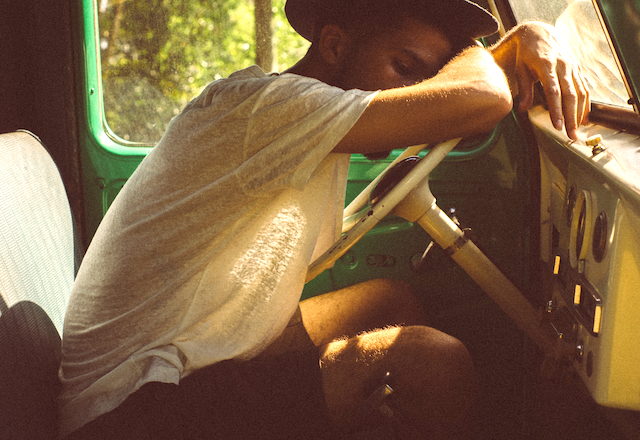A few weeks ago, I decided to go for a long drive.
I put on a playlist and hit the road with the sounds of some of my favorite rock bands.
As Carry on Wayward Son by Kansas poured from the speakers, I rolled down my windows to enjoy the respite of a cool spring day, my arm hanging out of the window.
Head bobbing, I joined the band, adding my own off-key but no less enthusiastic vocals to theirs. It wasn’t until I found myself stopped at a nearby traffic light I realized I had become the focus of a group of dismayed teenagers who, no doubt, wondered if I was off my medication. With nothing left to do, I shrugged, smiled, nonchalantly averted my gaze, and continued my performance, albeit with a bit less enthusiasm.
Having looked away, I noticed a graying mini-warehouse surrounded by a six-foot aluminum fence. Though I had passed it many times, I had never really seen it. A white banner with bold blue lettering hung from the fence gate, enticing passersby with an irresistible offer: “First Month Free.”
I didn’t think much about it at the moment, but as I continued, my drive I noticed more of these ubiquitous facilities in which people hide the treasures they will need later. As I passed them, I imagined 8 x 10 units bulging with antique furniture, lawn mowers in various stages of repair, yellowed photographs, musical instruments, and rolls of shag carpeting, stacked amongst boxes of clothes, videotapes, and other things with which we can’t seem to part.
To be clear, I have struggled to let go of material things in my past.
But I’ve been paring things down for a few years now, trying to be more mindful of my penchant for acquiring stuff. After all, how many pairs of boots or jeans does one guy need? I suppose I’m not doing my part to fill up the more than 2.3 billion square feet of storage space that are estimated to be available in the United States.
If the average home in the United States is 2,300 square feet, that’s enough space for one million houses. That’s a lot of extra stuff we have to keep up with.
But like I said, I’ve struggled with what to keep, what to toss, and often wondered, “Why did I ever buy this?” You can fill in the blank with your own list: piece of furniture (bean bag chair), pair of pants (expandable waist), lamp (lava), or a poster (black-light panther…Don’t judge me, I turned 13 in 1973).
I’ve got nothing against stuff. I like stuff. It’s just that these days I like to have them, rather than them have me. I’m not an ascetic. I own some things that aren’t always practical because they give me a certain amount of joy—a select collection of books, music, and art.
I still have every letter written to me while I was in college and I enjoy reading them from time to time. But more and more, I find keeping up with all of my stuff a hassle. It clutters my life. It clutters my mind. As it turns out, having fewer t-shirts and pairs of socks means choosing what to wear—even washing clothes—is much easier.
Last year, I came across Joshua Millburn’s book, Everything That Remains. The book is an honest, funny, and sometimes painful memoir that has prompted me to think more deeply about the things we use to fill our lives.
Clothes. Cars. Achievements. Relationships. All those things can fill the physical and psychological junk drawers of our lives without adding much value.
So now, thanks to Josh and a lot of additional reflection, there are three things I ask myself when facing the decision to buy or not to buy something, to add something to my to-do list, to enter into a relationship, to make a new business or a career decision.
First, I ask myself: What will this cost me?
This isn’t just about money. Though, that’s important. But material things, relationships, and experiences can cost you time. You can make more money, but you can’t make more time. So considering the time it takes to care for things and relationships, it seems wise to ask yourself if you are willing to give up an irreplaceable resource for them. Those things can cost you peace of mind, too. Buying expensive cars and paying for expensive travel can lead to buyer’s remorse since they are often associated with a credit card balance or a monthly loan payment. So, ask yourself if they are worth the emotional burden.
Second, I ask myself: Will I be glad that I made this decision in 30 days, six months, one year, or longer?
Most of us have trouble thinking too far into the future. The momentary joy of some decisions can erode with time. I like the saying, “The two happiest days of a man’s life—the day they bought the boat and the day they sold the boat.”
I’ve never owned a boat, but I did have this experience once with a truck. Buying it was awesome. I had always wanted a truck. But this was the wrong truck. I bought it simply because I could afford it, not because it was the right truck for what I needed. Within 90 days, I wasn’t happy with my decision. So I had complicated my life with the need to unload it, to buy a new vehicle, and then suffer the indignity of admitting to myself I had made a bad decision.
Finally, I ask myself: What is it within me that makes me want for this thing/experience/achievement/relationship?
So many times we are trying to fill emotional gaps within us with some from the outside. We long for respect. We long for adventure. We don’t want to be alone. There’s nothing inherently wrong with any of those things. But we’re often dealing with what Buddhism calls clinging. But when we try to fill ourselves with things that might well be insatiable longings, we are destined to live lives of excited misery, chasing the next thing we hope will satisfy us or trying to avoid things that cause us pain.
Thankfully, with less stuff, I’m travelling lighter these days. The journey really is easier that way. Strangely, I now find myself reflecting on the words to that Kansas song I was singing on that beautiful spring day a few weeks ago.
Once I rose above the noise and confusion,
Just to get a glimpse beyond the illusion…
As I mouth the lyrics, I find myself seeing the song for far more than I once did.
I suppose that’s a lot of what mindfulness about our stuff and our experiences is all about—rising about the noise and confusion—getting a glimpse beyond the illusion.
So, hoping I’m not a wayward son, I’ll just carry on.
Author: Jim Owens
Image: Lechon Kirb/Unsplash
Editor: Sara Kärpänen









Read 2 comments and reply